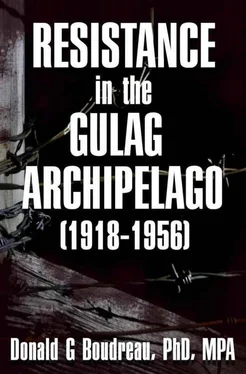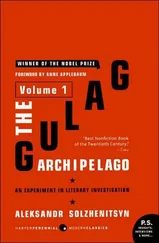Prior to examining the question of resistance as encountered in Solzhenitsyn’s Cancer Ward and The First Circle, it is imperative that we first come to appreciate how the Russian, generally speaking, perceives ‘justice’ and ‘freedom’. Materialism, too, indubitably plays a role here. As we will see soon, materialism served as a catalyst to certain forms of resistance manifested in the Gulag camps.
One finds no deep-rooted tradition of and love for personal freedom per se, but there does exist a profound commitment to “justice”; it is from this commitment that Solzhenitsyn truly speaks for his people. Andrei Amalrik writing in his Will the Soviet Union Survive Until 1984? (1970) may be correct in maintaining that for most Russians “freedom” is synonymous with disorder, that “individual” and “personal” human personality has no particular value, and thus must be considered subordinate to the “communal” interest. He may even be accurate in contending that Russian love of justice is far less vigorous than Russian respect for brute force, and that in practice, what passes for love of justice is simply a kind of equalitarianism which says that no one should live better than the next person.
This idea of justice is motivated by hatred of everything outstanding which we (Russians) make no effort to imitate, but, on the contrary, try to bring down to our level, by hatred of any sense of initiative, of any higher or more dynamic way of life than the life we live ourselves. This psychology is, of course, most typical of the peasantry and least typical of the “middle class.” However, peasants and those of peasant origin constitute the overwhelming majority of our country. [22] Andrei Amalrik, Will the Soviet Union Survive Until 1984? p. 35.
Yet Solzhenitsyn’s position is inimical to that which has been expressed by Amalrik. For Solzhenitsyn is convinced, that his stubborn insistence on justice may find more fertile ground in the Russian spirit, than his equally stubborn concern for freedom and the individual personality. Because Solzhenitsyn earnestly believes that the urge to justice is inherent, in the spirit of men, everywhere.
Justice has been the common patrimony of humanity throughout the ages. It does not cease to exist for the majority even when it [is] twisted in some (“exclusive”) circles. Obviously it is a concept which is inherent in man, since it cannot be traced to any other source. Justice exists even if there are only a few individuals who recognize it as such. The love of justice seems to me to be a different sentiment from the love of people (or at least the two only coincide partially). And in periods of mass decadence, when the question is posed, “Why bother? What are the sacrifices for?” it is possible to answer with certainty: “for justice.” There is nothing relative about justice, as there is nothing relative about conscience. Indeed, justice is conscience, not a personal conscience but the conscience of the whole of humanity. Those who clearly recognize the voice of their own conscience usually also recognizes the voice of justice. I consider that in all social or historical questions (if we are aware of them, not from heresay or books, but are touched by them spiritually), justice will always suggest a way of action (or thinking) that is not in conflict with one’s conscience. [23] Giovanni Grazzini, Solzhenitsyn: a biography , pp. 249-50.
But Solzhenitsyn and the remainder of that courageous band of dissidents and reformers in the Soviet Union, are living in a period and a society of mass decadence, and despite their intrepidity and moral courage, their prospects are surely bleak. Their numbers are small, their power is extremely limited, and they are trapped between a hostile regime and an indifferent populace. This represents a precarious position to say the least.
Yet, both Solzhenitsyn’s Cancer Ward and The First Circle end on a note of contingent optimism. In the former, Oleg Kostogolov finds that his body and the body politics have had simultaneous remissions from the cancers afflicting them, and though he returns to exile, he knows that it is no longer perpetual exile, and he has the hopes that things are on the mend. In the latter, Gleb Nerzhin deliberately has himself sent from the first circle of hell to its lowest depths, consciously heartened and hardened by the determination to survive and to write his history, which will indict the institutions and individuals responsible for having brought him and his country to such a state. Throughout, Solzhenitsyn’s hopefulness is guarded, made ambiguous by irony and humor, sometimes even by gallows humor, but the hope is there nevertheless, refusing to die.
In The First Circle we are witnessing a penal society throwing into dramatic relief the basic human condition: the trivial becomes tragic; the absurd becomes profound; weakness becomes strength and unseasoned faith gives life its only logic. Solzhenitsyn sets his story in a few fleeting hours from December 24th to the 28th, 1949. The scene is a special prison “institute” in Moscow. The characters are the prisoners, their guards, the directors of the Institute, the high officials of the Police Ministry.
A Stalinist directive issued in 1948 has created this special prison and given it its purpose: a crash program to invent a voice scrambler and voice-identification technique. This technique will be used by Stalin and the Organs to indict those who thrive as “enemies of the state.”
The spirits who inhabited Dante’s First Circle had committed no sins and this, in essence, is equally true of those who inhabit Solzhenitsyn’s First Circle. The gulag was hell on earth, and Solzhenitsyn was its Dante. As in Dante’s, this Circle stands on the edge of the eternal abyss, and descent is easy, frequent and almost inevitable. But Solzhenitsyn deals not with the spirits of the past. His men and women are composed of flesh and blood. All of their dreams are possible. Gleb Nerzhin, the brilliant prisoner-mathematician, distinguishes between the rhetorical objectives of the Bolshevik Revolution and the unequal operative values.
What was the Revolution against? Against privileges. What were the Russian people sick of? Privileges: Some being dressed in overalls and others in sables, some dragging along on foot. While others rode in carriages, some listening for the factory whistle while others were fattening their faces in restaurants. True? Of course. Right. Then why is it that people don’t shun privileges but pursue them. I’ve simply come to the conclusion that if it’s to be equality, then it must be equality for everyone, and if it isn’t, then shove it. [24] Alexander I. Solzhenitsyn, The First Circle , (hereinafter “Circle”), p. 268-9.
Solzhenitsyn is resisting national inequality in the Soviet Union. This problem was foreseen by Marx and Engels as the noted Soviet historian Roy A. Medvedev (1972) documents in Let History Judge .
Marx and Engels, who foresaw the possibility of the bureaucratic degeneration of a proletarian state, thought two measures would provide effective protection: universal election and recall of all officials and a level of salaries not exceeding workers wages. [25] Cf. Medvedev, at 538.
Yet, the Soviet Union possesses no means, no organizations, and no political institutions to guarantee citizens democratic rights. For the most part, restrictions on official salaries turned out to be a livid deterrent to degeneration. Undoubtedly, there were some prisoners who constantly inquired into the limitations of the law and as to their rights. Solzhenitsyn, as portrayed by Gleb Nerzhin, was indubitably cognizant of his rights and the governmental violations thereof.
Читать дальше












